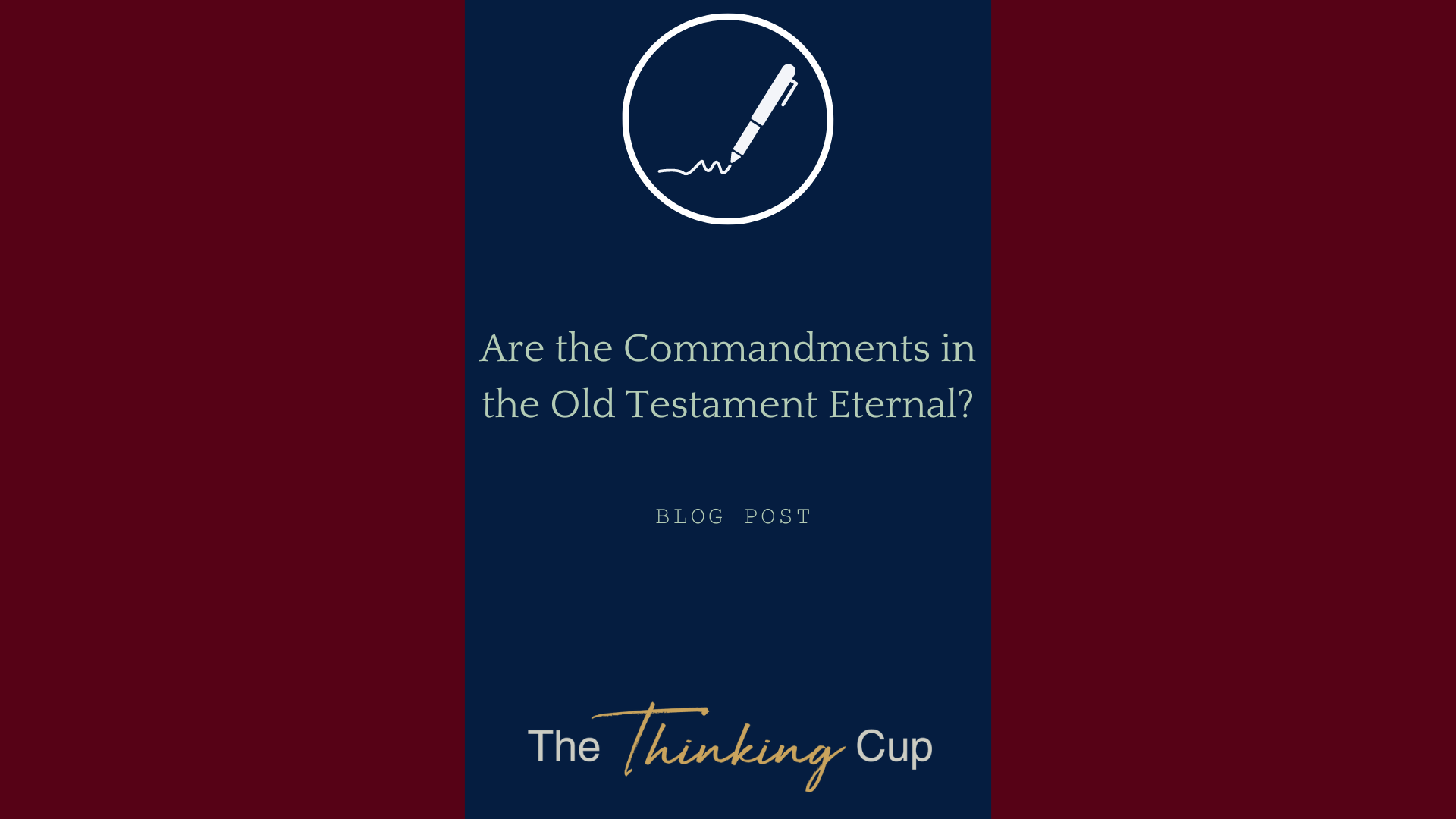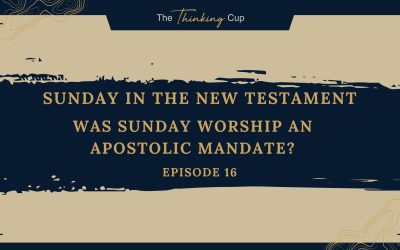The Ten Commandments are exclusively God’s eternal, inviolable, irrevocable, moral law that transcends all time and culture. They were written with God’s own finger on stone. They are a permanent, all-encompassing, stand-alone law because they were written on stone. They are distinct and separate from the ceremonial Law of Moses, which is written in the Book of the Law and placed at the side of the Ark of the Covenant. The ceremonial Law of Moses has been abolished, but the Ten Commandments remain to be kept by all. They are the transcript of God’s character and can never change.
(We must address this statement in several sections. Each section can be viewed independently of the others, but we must realize that this lengthy statement works together to form a framework for understanding and interpreting the law.)
We will address the first statement:
The Ten Commandments are exclusively God’s eternal, inviolable, irrevocable, moral law that transcends all time and culture.
There isn’t anything in the Biblical text that makes these claims. Laws are only able to remain applicable as the culture changes if the laws themselves adjust with the culture. This is one of the reasons the Ten Commandments are so ambiguous when it comes to actually how one is to keep them.
Laws change with time. If we were to transport back into the early 1700s and place speeding signs and traffic lights, would it make any sense to expect the residents of the 1700s to abide by these laws? Under a different culture and government relationship. The reverse is true as well. Would we expect the residents of the 1700s, if they could be transported to today, to ride their horses and buggies on the highways and keep up with the speed limits? Wouldn’t they get tickets for breaking the law by impeding the flow of traffic? The laws change with the culture, time, and government relationship.
While this is a simple analogy, many will claim that these ‘moral’ laws are different because God doesn’t change. This is a lame argument. The assumption in this statement is that God lives by rules that He cannot break, and therefore, these rules are in the Ten Commandments. God doesn’t live by the Ten Commandments. Why would he have a law that states to “honor your mother and father” when He doesn’t have a beginning or an end?
The Ten Commandments were given to a specific nation for a specific reason under a specific covenant.
“And the Lord said to Moses, ‘Write these words, for in accordance with these words I have made a covenant with you and with Israel.’” (Ex 34:27)
In fact Moses is very clear that this arrangement was made with a specific group and didn’t include their fathers.
“And Moses summoned all Israel and said to them, ‘Hear, O Israel, the statutes and the rules that I speak in your hearing today, and you shall learn them and be careful to do them. The Lord our God made a covenant with us in Horeb. Not with our fathers did the Lord make this covenant, but with us, who are all of us here alive today.’” (Dt 5:1–3)
This should help us understand that the Ten Commandments, which are part of the covenant arrangement between Yahweh and Israel, were NOT in place before Mt. Sinai in Horeb. The Ten Commandments didn’t exist before Creation. There isn’t a single Bible text that supports the idea that the Ten Commandments are part of the laws of Heaven or that they are perpetual, eternal, and never-ending.
Adventists need the Ten Commandments to be never-ending because Ellen White states that they will be in place in heaven.
“The will of God is expressed in the precepts of His holy law, and the principles of this law are the principles of heaven. The angels of heaven attain unto no higher knowledge than to know the will of God, and to do His will is the highest service that can engage their powers.” [1]
She goes on to claim this was the very thing that started the rebellion in Heaven. The angels didn’t even know they were following a law until Satan made them aware of it.
“But in heaven, service is not rendered in the spirit of legality. When Satan rebelled against the law of Jehovah, the thought that there was a law came to the angels almost as an awakening to something unthought of.” [2]
There is no biblical evidence that this idea or concept even existed. It’s preposterous to think that one would use this framework to interpret the importance of the Ten Commandments.
Since the Fourth Commandment is so important to an Adventist, it would be valuable to spend some time on this specific Law. We will address in more detail the enternality and the desire to separate these laws into categories later.
The Fourth Commandment is not a natural, morally based law, and the Sabbath cannot be a moralistic law. Morality is not a festival to be kept. Leviticus includes the Sabbath within a list of Feasts that were to be observed as part of the covenant arrangement.
“The Lord spoke to Moses, saying, ‘Speak to the people of Israel and say to them, These are the appointed feasts of the Lord that you shall proclaim as holy convocations; they are my appointed feasts. Six days shall work be done, but on the seventh day is a Sabbath of solemn rest, a holy convocation. You shall do no work. It is a Sabbath to the Lord in all your dwelling places.’” (Le 23:1–3)
Morality doesn’t hinge on a specific segment of time. (Exodus 20:8-11; Lev. 23:32) Michael Morrison makes this important observation.
“We find additional evidence that the Sabbath is a ritual law in that God himself does not keep the Sabbath. It is not part of his nature. He rested once, but a six-one cycle is not part of his eternal nature. Nor do we have any evidence that angels keep the Sabbath; it was not designed for them. This means that the Sabbath is not an inherent part of the way good creatures show love to God or to one another. The Sabbath is not eternal, for it did not exist before creation, and will not be relevant in the new heavens and new earth. The Sabbath is not God’s nature, nor universal, nor timeless. It is a ritual law, saying that behavior that is good on Friday is not good on Saturday… Morality does not depend on the rotation of the earth, the day of the week, etc.” [3]
If we go back to my analogy of the horses and buggies riding on modern highways, we remember that laws change with the times. Keeping the Ten Commandments in context with the time and people they were given to, helps us understand that the Israelites were expected to keep them because of the covenant they were under. Right before the giving of the commands in Exodus 20, Yahweh makes this statement:
“Now therefore, if you will indeed obey my voice and keep my covenant, you shall be my treasured possession among all peoples, for all the earth is mine; and you shall be to me a kingdom of priests and a holy nation.’ These are the words that you shall speak to the people of Israel.” (Ex 19:5–6)
It also makes sense that they had certain penalties for not keeping the law. Breaking the Sabbath for an Israelite meant death.
“Six days work shall be done, but on the seventh day you shall have a Sabbath of solemn rest, holy to the Lord. Whoever does any work on it shall be put to death.” (Ex 35:2)
If the Ten Commandments transcend time and culture, then wouldn’t the penalties that go with the Law also transcend time and culture? Even if the penalty doesn’t apply today, Ex. 35:2 begs an important question, “What does not working look like in today’s culture such that I am not breaking the law?” This question should help us to understand the futile nature of trying to make the Ten Commandments fit into today’s culture and time when, biblically speaking, they were given to a specific nation under a specific time and covenant.
[1] Ellen Gould White, Thoughts from the Mount of Blessing (Pacific Press Publishing Association, 1896), 109.
[2] Ellen Gould White, Thoughts from the Mount of Blessing (Pacific Press Publishing Association, 1896), 109.
[3] Morrison, Sabbath, Circumcision, and Tithing.




So does this mean that today we are not compelled to keep the Sabbath?
I’ll be posting more on this topic, so stay connected to the blog posts.
The Sabbath is not an obligation for new believers. This is exactly what Paul was discussing when he addressed the Christians in Rome:
One person esteems one day as better than another, while another esteems all days alike. Each one should be fully convinced in his own mind. 6 The one who observes the day, observes it in honor of the Lord. The one who eats, eats in honor of the Lord, since he gives thanks to God, while the one who abstains, abstains in honor of the Lord and gives thanks to God. (Ro 14:5–6)
The Sabbath has been reframed under the New Covenant. Because of Jesus, we can enter His REST as the author of Hebrews states:
So then, there remains a Sabbath rest for the people of God, 10 for whoever has entered God’s rest has also rested from his works as God did from his. (Heb 4:9–10)
Under the New Covenant, the Sabbath has been redefined. Thanks to Jesus, we can now enter God’s rest, as the author of Hebrews explains.
It’s crucial to understand that this rest is not a mere 24-hour day of observance. It’s something far greater, made possible by Jesus’ sacrifice. We can find rest in Jesus, and in doing so, we can rest from our own works, all because of the work that our High Priest has done on our behalf on the cross.
You didn’t address why Earth was created in 6 days and God rested from His work on the seventh. What are your thoughts on that in relation to the seventh day being blessed and sanctified at creation?
Let me know if my most recent post helps to address the question. If it doesn’t I’d be happy to further elaborate.
https://thethinkingcup.com/2024/07/01/are-the-ten-commandments-especially-the-fourth-gods-moral-and-eternal-law/